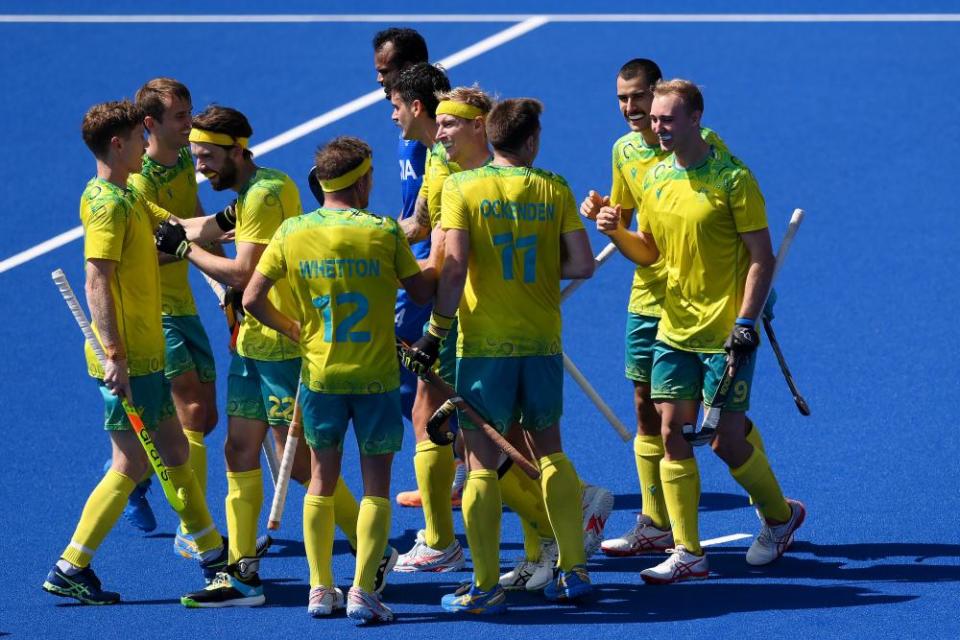Australia’s golden Games come to a close as Kookaburras win gold No 67

On the opening night of the Birmingham Commonwealth Games, Eddie Ockenden marched into Alexander Stadium, carrying the Australian flag with the broadest of smiles. A distinguished servant of Australian hockey for 16 years, Ockenden was a popular choice for the honour. His excellence with the hockey stick and his humility away from the pitch were on display again on Monday as the Kookaburras finished the Games with a gold medal.
Related: Birmingham got it right but future of Commonwealth Games is uncertain
A decider pitting the silver and bronze medallists at last year’s Tokyo Olympics against each other soon became a mismatch as Australia trounced India 7-0 in a romp to the gold medal. This was seventh heaven for Australian hockey, with the Kookaburras having claimed all seven tournaments when the sport was played in the Commonwealth Games. Australia have now won 41 of the 42 matches they have played at this level. In finals, the combined scoreline reads 33-2. Routs have become routine.
Ockenden, who equalled Kookaburra great Mark Knowles as a four-time gold medallist, has now featured in four memorable campaigns. An Olympic gold is the missing piece. He has a silver medal from Tokyo and bronzes from Beijing and London. Although 35, he harbours ambitions for Paris in 2024.
“It has been incredible. You won’t find anything else in your life you can do so passionately,” Ockenden said. “To be able to play hockey for so long and do what I’ve been able to do, I have been very lucky.”
The Australians scored from seven of their 23 shots for goal while restricting India to just five attempts. It could be argued Indian keeper PR Sreejesh did well given the barrage. Jacob Anderson and Nathan Ephraums scored two goals each, while Blake Govers, Tom Wickham and Flynn Ogilvie were also on the scoresheet.
Captain Aran Zalewski shared the co-captaincy with Ockenden and was full of praise for the Tasmanian who is still running around “like a spring chicken”. “He’s played a record amount of games for the Kookaburras, but he is such a humble guy and great fella,” he said.
After the Diamonds recorded the nation’s 1,000th Commonwealth Games gold medal on Sunday night, the Kookaburras took the tally to 1,001 on Monday. Silver and bronze medals were also claimed in diving, along with another silver in table tennis, on a smaller program of events leading into the closing ceremony.
Jian Fang Lay and Minhyung Jee were beaten 3-0 by a Singapore combination in the women’s table tennis doubles final. But for Lay, 49, winning another silver medal 20 years after managing the same feat on debut for Australia in Manchester is a celebration in itself. “I am so proud of that effort. It is unbelievable,” she said.
Australia ended the Commonwealth Games with 67 gold medals, 11 ahead of second-placed England. The Australians claimed 178 medals overall to edge the host nation by two. Aside from Glasgow in 2014, the Australians have topped the table in every Commonwealth Games since 1990.

Australian chef de mission Petria Thomas, who contributed nine of those golds during a distinguished swimming career, praised the squad for the excellence of their performances.
“It is an honour to lead this team and watch our Aussies shine both on and off the field,” she said. “The team has performed on the field of play and, generally, just the way they have conducted themselves out and about, they have been great ambassadors for Australia.”
Thomas did concede there was an occasional blemish. Eyebrows were raised when cricketer Tahlia McGrath played the final despite testing positive for Covid-19 on the morning of the match. It was within the rules of this competition.
Australia instituted stricter rules than other nations when it came to Covid precautions, though some of the nearly 700 athletes did stretch the boundaries. Decent coffee shops had an increasing number of athletes including those wearing the green and gold as the Games went on.
“We certainly made it very clear to our team members what the expectations were around our Covid protocols. But having said that, people are human. They make mistakes,” she said. “There were some people who didn’t wear masks for various reasons at different times. But on the whole, we have done a pretty good job.”
Joining Ockendon as a flag bearer, the decorated diver Melissa Wu was given the honour of leading a triumphant team into Alexander Stadium to close the Games. A silver medallist in Melbourne in 2006 as a 13-year-old, Wu added another highlight to her career when partnering 14-year-old Charli Petrov to a gold medal in the 10m synchronised platform in Birmingham.
The 30-year-old had planned to enjoy a few slices of pizza while watching the closing ceremony from the athletes village, but was eager to embrace the honour. “I will be a bit overwhelmed by it. I’m just going to really take it all in and enjoy it. It’s going to be a great moment,” she said.

 Yahoo Sport
Yahoo Sport 





































